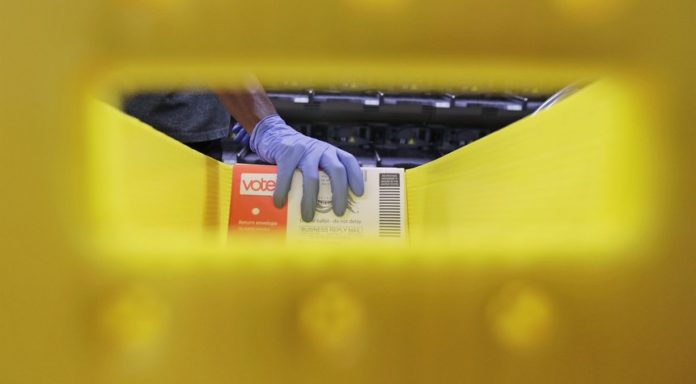I have written extensively about California’s election laws and the specific problems that were created by laws passed in 2016, 2020, and 2021, with the purported purpose of “expanding accessibility.” However, these laws open the doors to fraud and massive election integrity problems. We all know that these practices have been adopted in many states, and Democrats would love to see them taken nationwide. Although conservatives need to play the game in its current form to win, it is equally important to fight these laws using all means possible. For Californians, lawfare seems to be the best way to fight them right now.
The people at Election Integrity Project California are leading the fight. In early 2021, they filed suit against Alex Padilla (then-Secretary State), Xavier Becerra (then-AttorneyGeneral), and 13 county registrars on behalf of their group and 13 candidates for Congress in 2020 (including Buzz Patterson of RedState). The suit alleges that there are not enough safeguards to prevent ineligible persons from receiving mail ballots (that voter rolls haven’t been cleaned up essentially) and that Secretary of State regulations prevent meaningful standards from being applied in verifying signatures on vote-by-mail ballots. It also claims that different votes were treated differently depending on where they were cast.
EIPCa complained about “700 affidavits under penalty of perjury signed by EIPCa-trained observers, who consistently reported election workers failing to adequately verify signatures and, sometimes, counting ballots with no signatures,” which means there are specific examples and not general possibilities.
The case against all defendants was dismissed by Judge Andre Birotte, Jr. of the US District Court in August 2021. He ruled that neither the institutional plaintiff nor the individual plaintiffs had standing and that the court did not have subject matter jurisdiction. Plaintiffs appealed and a three-judge panel of the 9th Circuit Court of Appeals ruled in favor of EIPCa and held the court competent. The case was remanded to the US District Court for further discovery.
Mariah Gondiero is the lead attorney. She noted that it was a big win to get past your standing.
“This lawsuit is significant because it is the first to challenge California’s constitutionality of its election laws and procedures.” “We are the first to overcome standing.” “California will have to enforce uniform and secure vote-casting procedures and count votes if we win.”
Although the memorandum can’t be considered precedent, it did contain some language that was very helpful for those who are interested in secure elections or standing against legislation that hinders our ability to exercise constitutional rights.
Further, the complaint alleges that EIPCa was forced “to expend significant additional resources to facilitate observation of voting practices and document obstruction and irregularities.” An organization’s devotion of “significant resources to counteract the defendants’ practices,” Sabra v. Maricopa Cnty. Cmty. Coll. Dist., […] including “[d]iverted staff time,” see Fellowship of Christian Athletes v. San Jose Unified Sch. Dist. Bd. of Educ., […] constitutes “a concrete and demonstrable injury.”
Surprisingly, the defendants claimed that EIPCa’s injury had been “manufactured” by them and that they spent money to fix a problem that would not have affected the organization.
The “emergency regulations” of 2020 have been codified. This means that the injury will not stop and EIPCa can continue to sue.
Contrary to the dissent, it is alleged in the complaint that the state will continue to divert these resources into the future. The complaint alleges that California has passed legislation that requires every California voter to be eligible to vote by mail. However, the state has not established procedures to ensure that such voters are eligible in the future. Further, the complaint alleges that California’s Secretary-of-State promulgated regulations that prevented meaningful standards from being applied in order to verify signatures on ballot-by-mail ballots. These inefficient processes create “massive chances for both fraud and error,” and “[b]ecause similar or substantially similar laws and regulations, orders, and practices are governing and WILL govern upcoming elections”, the complaint states. “The same situation will again occur” in future elections. As we have held for many years that a threat of injury can be considered an injury if there is “a credible risk of harm” in the future, Krottner Corp., and not a hypothetical fear “of future harm,” Clapper Inc. . .”
EIPCa can now issue subpoenas to individual plaintiffs to obtain records regarding voter registration, purge or lack of eligible voters, vote tabulation, and other related matters. This could be very interesting and potentially damaging. It’s possible that the evidence could prove that certain races were not correctly called or that fraud was committed. There is no remedy for this situation since it has been over two years and there will be many more years before the discovery process is completed.
It could also mean that in the end, state legislatures across the country won’t be able to enact these types of election laws. Instead, they will have to clean up voter rolls and ensure security for future elections. In the interim, California election officials may be issued temporary injunctions requiring them to comply with all measures to stop ineligible voters from casting ballots. The complaint states that California is not following the provisions of the NVRA relating to the maintenance of voter rolls.
It is important that conservatives in the country support this suit financially because the ramifications of the decision will spread across the entire fruited plain.


